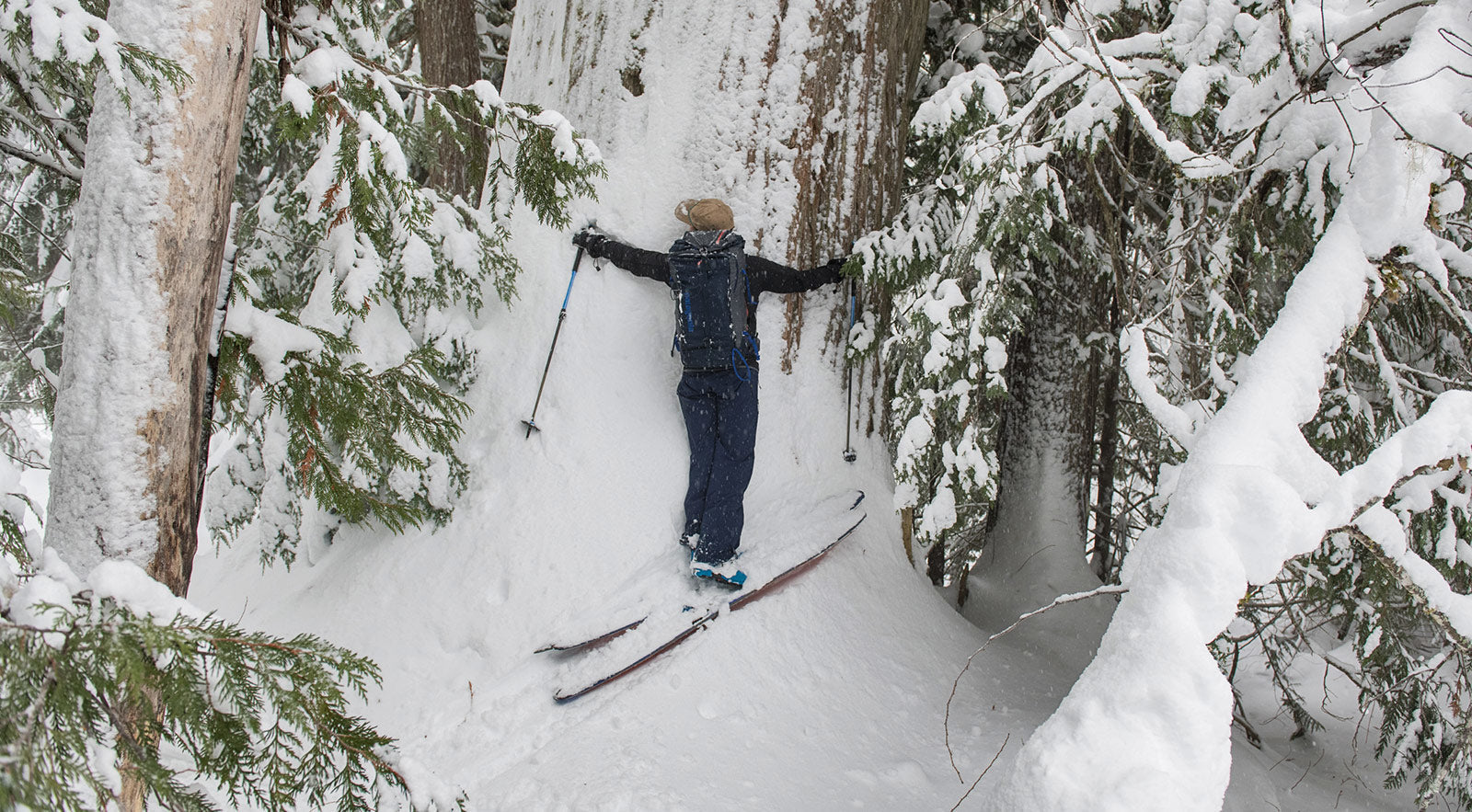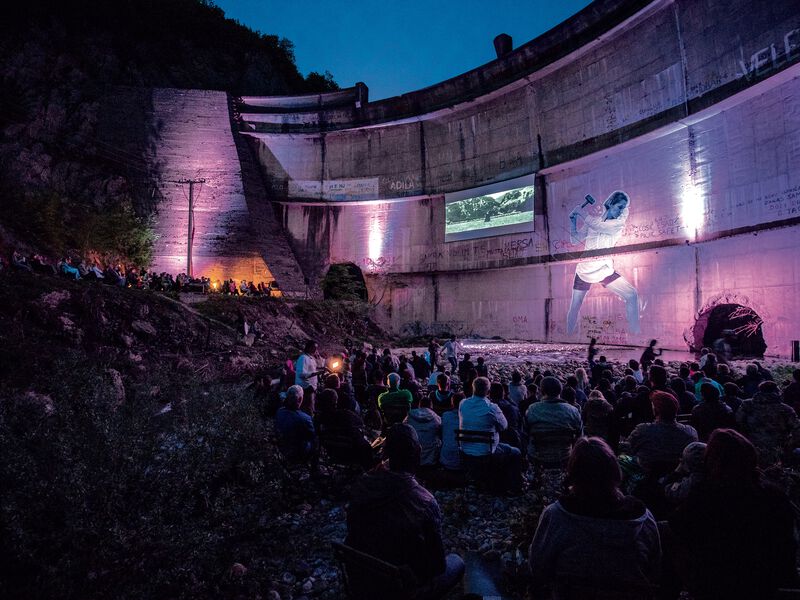They are the oldest living beings we come to know during our time on earth, living bridges into our planet’s expansive past. Treeline is a film celebrating the forests on which our species has always depended—and around which some skiers and snowboarders etch their entire lives. Follow a group of snow-seekers, scientists and healers as they explore the birch forests of Japan, the red cedars of British Columbia and the bristlecones of Nevada, delving deeper into the rich environments they call home. Deb MacKillop is one of those individuals whose life revolves around trees.
Tree Nerds Like Me: Into the Forest with Ecologist Deb MacKillop
In seventh grade, Deb MacKillop and her class took an aptitude test to determine their most fitting future occupation. According to the results, MacKillop’s natural talents suggested she’d make a good forester—a desirable occupation for a small-town Canadian, living among some of North America’s grandest forests. At the time, however, she was disappointed; she assumed that kind of job was for grizzled old men who liked to cut down trees. “As if I was going to become a forester,” MacKillop says, laughing as she recalls her middle-school response.
Three decades later, MacKillop has a different view. In what’s either a turn of irony or a testament to aptitude tests, the smiling, bright-eyed 43-year-old now works as a research ecologist for the government of British Columbia. It was here, amid the mist-covered Kootenay Mountains, that the skier, biker and scientist unified her passion for her childhood forests and favourite adult pursuits into a career, one that’s allowed her to both enjoy and protect the home she loves.
“With MacKillop’s data, natural resource managers can make more informed stewardship decisions about a complicated issue.”
MacKillop grew up in the aptly named Edgewood, a tiny town in Interior British Columbia set against a large lake and surrounded by big woods. At age 18, she left home to attend university in Toronto but was constantly scheming about how to get back. She did so through a master’s degree in forest science from the University of British Columbia, after which she became a registered professional forester. This role allowed her to work beside timber harvesters and land managers, researching the red cedars and hemlock of her youth.

Western red cedar bark. "Thuja plicata" is one of the dominant species in BC's inland temperate rainforest, and can grow to heights of over 200 feet, with trunk diameters in excess of 20 feet at the fluted base, and reach ages of over 1,000 years. Photo: Garrett Grove
“While I was away at school, I missed the forest,” she says. “Much of British Columbia is available for timber harvesting, and how, where and when logging takes place—or doesn’t—really matters. Since foresters are the people who make those decisions, I decided to become one. I wanted to know how forests grow and develop so I could find better ways to balance conservation and logging.”
On a personal level, the mountains in which MacKillop now lives are perfect for a hard-charging skier and professional mountain biker like herself. But as a forester, they’re literally one of a kind: The area fosters an extremely rare ecosystem called the inland temperate rain forest, which can only be found in British Columbia’s interior and very small pockets of northern Idaho and Montana. Coastal air masses blow hundreds of miles east across the Interior Plateau and slam into the steep, mountainous terrain, creating wet, humid conditions otherwise rare so far from the ocean. This heavy moisture creates a haven where hemlock and Western red cedar survive for thousands of years and grow to more than 30 feet in circumference. As a result, this area contains proportionally more old-growth trees—250 years or older—than most forests elsewhere in the world.
These are MacKillop’s favourites. She prefers to work with trees that are not “huggable,” meaning their circumference is bigger than 50 centimetres—or the minimum size she can wrap her arms around and still touch her fingers together (barely)—and it’s not uncommon to see her actually hugging a tree. “As a forester, it’s handy to know the length of your limbs,” she says. “They make great measuring tools.” She is drawn toward these larger, older trees because she feels most rooted in their presence, knowing they have endured change and flourished for at least three human lifetimes.
The same conditions that allow trees to prosper also make for excellent skiing conditions, which MacKillop has been enjoying almost her entire life. Growing up, she and her sister would suit up and clip on their cross-country skis in the house, slide out the back door, and glide into the forest as far as their legs would carry them. “As kids we were lazy and didn’t want to get snow in our boots,” she says. At the time, she didn’t realise how fortunate she was. As she puts it now, “If you get to ski here, you are pretty lucky.”
MacKillop has translated this love for her home landscape into 40,000 square miles of technical code, which will help determine where biodiverse forests have declined due to timber harvesting and where disturbances due to the increased fires and windstorms expected with climate change will continue to rise. With MacKillop’s data, natural resource managers can make more informed stewardship decisions about a complicated issue.

One hell of a happy place. Deb MacKillop, in her element in the BC backcountry. Photo: Ali Watt
MacKillop’s career and passions constantly overlap; whenever she’s out skiing or biking, she’s also checking in on her favourite tree and plant species. “I’m being efficient and working all the time, double-checking whether I’ve mapped ecosystems correctly,” she says. In the 30 years since that aptitude test, her relationship with these conifers has only deepened. “Skiing in the alpine is amazing, but it’s even more amazing if you can ski into a forest below,” she says. “To link up a line that goes from alpine, to subalpine spruce and fir, maybe even mountain hemlock into cedar … that’s the coolest day out there. For most people, not just tree nerds like me.”
Meet more passionate personalities like Deb in the Treeline film- tour coming soon.





